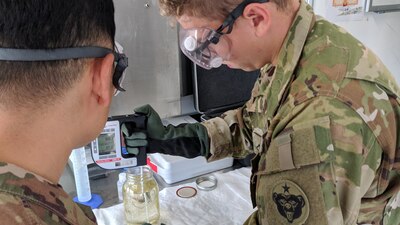
ERBIL, IRAQ, Nov. 1, 2019 —
Petroleum supply specialists, categorized as military occupational specialty (MOS) 92F, oversee the Army’s use of petroleum – but their duties far exceed those of gas station clerks.
Soldiers from the 320th Quartermaster Battalion and the 103rd Expeditionary Sustainment Command (ESC), 1st Theater Sustainment Command operational command post conducted a two-week quality assurance visit (QUV) to Iraq from Oct. 11-26, 2019 – visiting four different sites – to ensure compliance with the standards set by U.S. Army Central’s (ARCENT) checklist.
Staff Sgt. Darryl Jackson, petroleum supply specialist, 320th Quartermaster Company, was part of three out of four visits on this mission – Kirkuk, Q-West, and Bashur.
“We fly out to each different site, introduce ourselves to each accountable officer and NCOIC (noncommissioned officer in charge), and then we will do a walk through where we ask questions from the checklist.” Jackson said. “These questions help us determine where they are lacking but also to see if they think there is anything that they might need.”
From landing on ground, to meeting the accountable officers and NCOICs, to running through ARCENT’s 27-page checklist, these visits often only take just a couple of days.
“The duration of these visits really depends on the size of the site,” Jackson said. “We get there and check everything from fire extinguishers, to standard operating procedures, to containers. For the three sites my team visited in Iraq, they didn’t take too long – two days max.”
There main goal of these visits is quality assurance – but more importantly, safety.
“We want to go out and conduct a QAV to ensure that each fuel site is operating in a safe manner. If there is anything they are lacking, I would write up a report and send it up to higher. That way we could expeditiously get them the requirement that they need to conduct fuel missions safely” Jackson said.
There are some key areas that Jackson and his team are looking to address – potentially even leading to an extension at a site.
“If we get there and reporting is off or if any unsafe procedures are being conducted, then I would stay a little longer to show them the correct way to do it,” Jackson said. “Some units are coming in fresh out of AIT (Advanced Individual Training) and have little experience in an environment like this, but most of them have really good NCOICs who have experience and can mentor those Soldiers.”
If a unit ends up needing extra assistance or receiving a bad report, Jackson and his team would make recommendations on how they could make improvements.
“The checklist has a pass/fail standard but wouldn’t make these sites inoperable or determine whether or not they are mission capable,” Jackson said. “We would make sure that our recommendation is there so that they could get up to a standard to continue operating safely.”
Missions like this are important to ensure that fuel sites are in compliance with ARCENT’s standards, he said.



